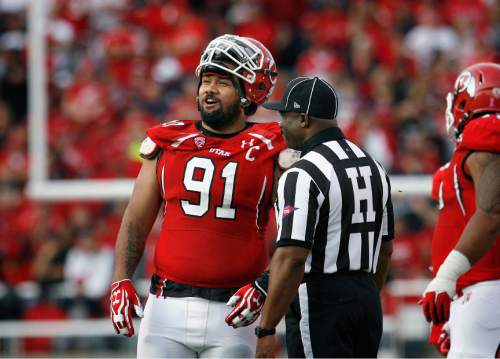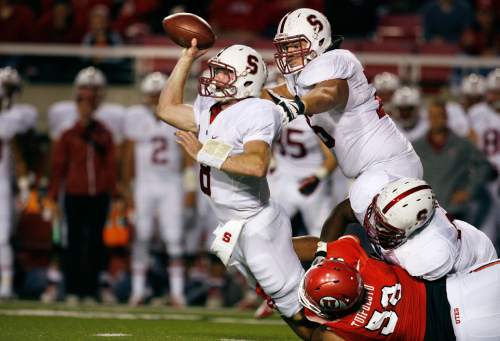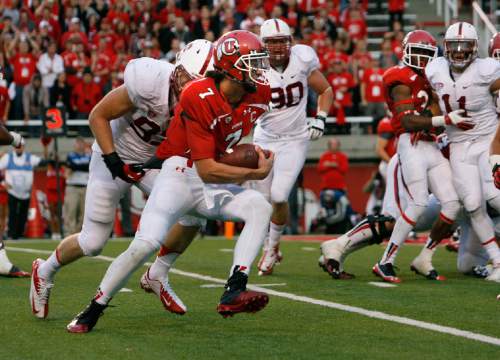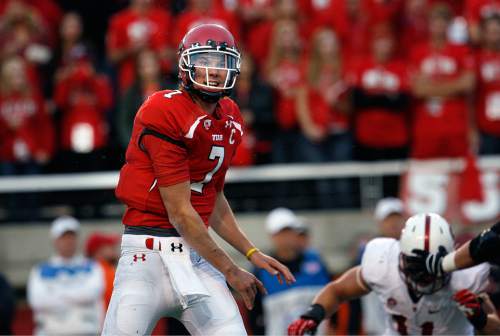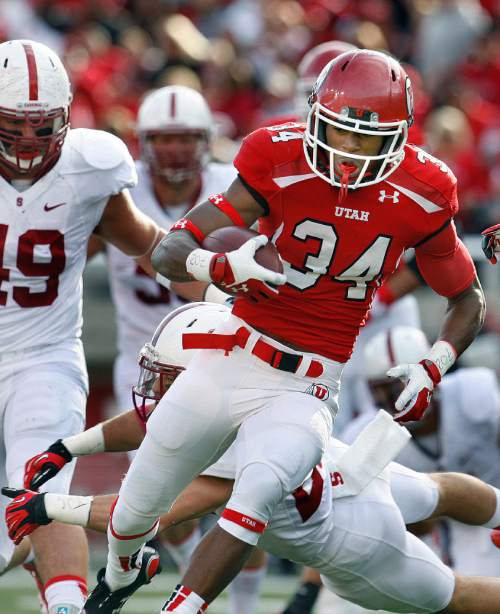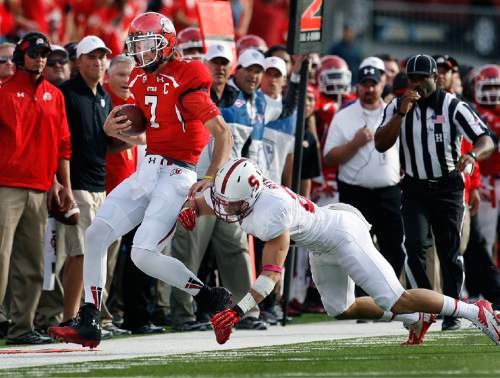This is an archived article that was published on sltrib.com in 2014, and information in the article may be outdated. It is provided only for personal research purposes and may not be reprinted.
Palo Alto, Calif. • Walking out onto the field at Rice-Eccles Stadium last year, Stanford head coach David Shaw said, was an unusual experience for his players.
On the opposite sideline stood guys who were bigger than them.
"More often than not, we're the bigger team," he said, "and that was not the case against Utah, and it won't be the case again this year."
They are not a precise mirror image of each other: The Cardinal play a 3-4 defense, not a 4-3, and offensively have traditionally relied more than the Utes have on the run.
But Stanford and Utah have cultivated similar identities as the Pac-12's counterprogrammers. In a conference known for its high-octane offenses, they won't burn you so much as they'll bruise you. They expect to have battered their smaller opponents by the fourth quarter — and then, they expect to win.
"We pride ourself on being physical here, particularly on defense and along the offensive line," said Utah head coach Kyle Whittingham. "I'm not speaking for them, but that appears to be their M.O., when you look at the tape."
Average listed weight of an expected Stanford starter: 249 pounds. For Utah, it's 247.
In 2013, Utah won the heavyweight bout, outmuscling No. 5 Stanford for a victory that was easily the host school's greatest achievement since joining the Pac-12.
If Utah beats Stanford this year, it won't be the difference between the Rose Bowl and the BCS National Championship game for the Cardinal, but it again will be — in the eyes of bettors — at least a mild surprise.
At 5-4, Stanford is an eight-point favorite against No. 25 Utah despite losing to every ranked opponent it has faced — as opposed to last regular season, when it beat all six.
But there's sense in that.
Statistics suggest Shaw's team is somewhat due.
Unlike the Utes, who have averaged 18 yards less than opponents, Stanford has outgained foes by 107 yards per game. The offenses are similarly pedestrian — in a reverse of recent history, Stanford passes more and rushes less than Utah — but the Cardinal defense is uncommonly stingy, conceding just 281 yards per game.
Utah is 6-3 and Stanford is 5-4 because the 2014 Cardinal is marked by two very un-Stanford-like attributes: horrific red zone offense (124th among 125 FBS schools, at a shade under 65 percent), and an abysmal turnover margin (giving up one more than they get per game).
That's not exactly bad luck. Touchdowns and turnovers are not earned by wishing upon a star. But the Cardinal can't get much worse in those departments.
Quarterback Kevin Hogan has not taken the strides forward expected of him as a senior, but in targets Ty Montgomery and Devon Cajuste and a running-back-by-committee rushing attack that includes junior Barry Sanders Jr., Utah defensive coordinator Kalani Sitake has some reasons to fret. Where his defense is strong — a pass rush that leads the nation in sacks — so are the Cardinal, who have allowed just 18.
And Whittingham expressed concern this week that with inconsistent quarterback production and the loss of starting receivers Dres Anderson and Tim Patrick, Utah will be in trouble if Dave Christensen's offense becomes one-dimensional. The larger Cardinal may not be easily bullied by junior running back Devontae Booker.
Stanford has allowed more than 17 points just twice this season: visiting No. 3 Oregon and No. 7 Arizona State.
Utah has more than a puncher's chance, though. Many will wonder why they are underdogs at all against a team with no signature wins.
You can count Shaw among those who are impressed by the Utes, and who sees no great shame in being on the heels of a defeat by College Football Playoff favorite Oregon. He sees something a lot like his own team.
"You see maturity. You see guys doing what they're supposed to be doing. You see guys playing with energy and fire, and that game against Oregon was a lot closer than the final score. They know that, and Oregon knows that also. So this is a big challenge for us."
Twitter: @matthew_piper —
No. 25 Utah at Stanford
O Saturday, 4 p.m. MST
TV • Pac-12 Networks


